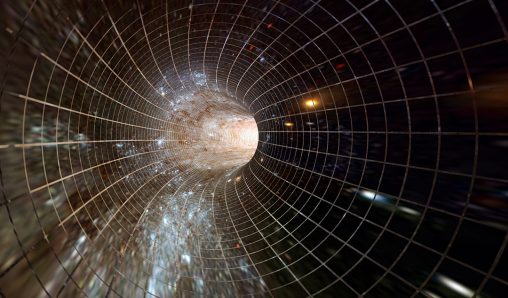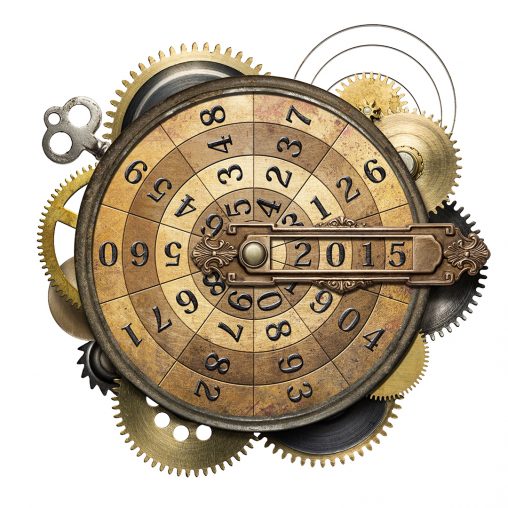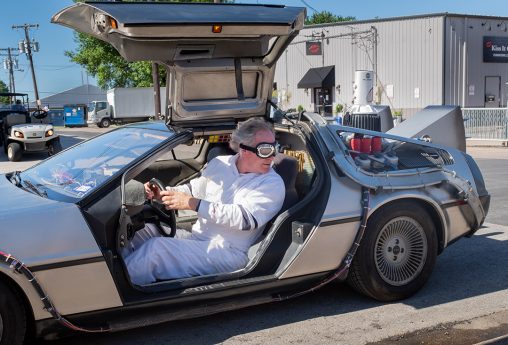Time Travel – a fascinating prospect

We’ve been fascinated with the past for centuries, for it defines our present world. In film, literature and now also computer games, we love to ‘go back’, but what if we could one day really travel back in time and see it all for ourselves?
People are as fascinated with the past as they are with the future; and of course, the two are related, connected by a present that we sometimes find less interesting. The promise of the future is equalled by the mystery of the past, and while we’ve all been given certain images of history at school, in movies and books, wouldn’t it be exciting to check it all out first-hand?
Many have theorised about what it was really like, their minds drifting to somewhat rose-coloured versions of the knightly Middle Ages, the power of Rome or the times of the Pharaohs. Authors, in particular, have found a rich vein of inspiration in historic settings that can vary from the Venetian Republic and Elizabethan England to 18th century France and the early days of America—but while most place their stories in the past, a relatively small number of writers actually made time travel their main topic.
The romance and mystery of the past
Jules Verne allowed his mind to project into the marvels of the future, but in A Connecticut Yankee in King Arthur’s Court, Mark Twain famously posited the fascinating clash of alternative times coming into contact with one another. Transported to an age of knights, his hero is a pistol-carrying apparition from the 19th century. It’s a delicious prospect that Twain portrays with all the enthusiasm of the Neo Romantic age, when 19th century thinkers marvelled at the so-called simplicity of medieval life and the noble chivalrous code of knights.

In the process, they revived legends such as that of King Arthur and his Knights of the Round Table, inspiring later writers such as Tolkien to create the kind of imaginary world that we enjoy today in Lord of the Rings. Imaginary it might be, but such tales are built upon a romantic Victorian vision of the past. Reality was, of course, very different, for the Middle Ages were more about squalor and suffering than about grand noble quests, and in this respect The Time Machine by H.G. Wells is not only more astute in its reckoning of past and present, but also deals directly with time travel.
Travelling in time
In arguably the greatest novel about time travel yet to be written, H.G. Well’s main character is ultimately disappointed by what he finds. A man of science, he chooses to see what the future holds in store, moving forward through a familiar cycle of war and recovery until he lands in a kind of Garden of Eden, where mankind finally appears to have achieved a sense of peace and harmony. Appearances are deceiving, and the deception continues when he travels to the end of the earth’s journey, which is pretty much like its primordial beginning.

If we travelled in time – backwards or forwards – we would likely also be disappointed. Our illusions of a glamorous past or promising future shattered by the hard rock of reality, but it would be fascinating all the same. Forget about Jurassic Park; this would be the ultimate theme park ride, an experience so intense and potentially dangerous as to make it a quite possibly a once-in-a-lifetime joyride. Some people dream of being able to travel in space, touch down on Mars and form part of a pioneering colony, but what if you could stay on earth and experience something just about as exhilarating?
What a ride it would be, choosing your spot in the future or past and being transported there in a flash, either as a fly on the wall observer or an actual participant. The latter would be quite challenging, as you’d stick out like a sore thumb and would have a hard time not being noticed and ganged up upon. Just imagine how our civilization would react if a ‘strange being’ appeared in our midst? So, going about unnoticed would require a great deal of research and preparation to ensure you’d speak, dress and behave like those around you, and of course this is only possible up to a point, and only really for the past, not the future.
Even so, it would be wonderful to marvel at the technology of the future or lose yourself in the mysteries of the past, travelling to ancient Egypt, Rome, Napoleon’s court or even the time of the dinosaurs. It would certainly be the most hazardous and impactful journey of a lifetime, but for now we have to make do with films, literature, daydreams and – the most realistic option to date – highly realistic computer games that virtually transport us to distant worlds in time. They can range from the ages of the empires to Stars Wars-like scenarios, and especially the strategy-based games make it possible to venture back and change the course of history – one of the most fascinating aspects that time travel could open up.

Will it ever be possible?
Just think if we could go back with our modern knowledge and values to right the wrongs of the past? It’s a tantalising prospect, but one probably best left alone for who knows what forces we would unleash and how they would change the world we know today? For now, all of this remains a dream, and advanced virtual reality games that create a lifelike custom-made simulation of past or future scenarios are likely to be the closest we’ll get to travelling through time. If it is possible at all, this particular human fancy will require a greater understanding of physics and far more advanced technology than we have available today, but this is not to say that it’s actually impossible.
Slowly, a door seems to be opening up, for where the laws of time were once thought to be purely linear the greater insights afforded by theoretical physics and string theory create a more dynamic picture of the universe. We already know that time, as the fourth dimension according to Einstein, is relative, and that it can be bent by gravity. Time dilation is therefore a reality, and forms the basis of NASA’s belief that time travel is theoretically possible, if very hard to realise in the physical field. Black holes, wormholes and cosmic strings could provide the answer, a means through which matter would bend time and space to circumvent the limitations of life as we know it.

The sci-fi film Interstellar plays upon this, as well as the theory that there is not one universe and timeline, but potentially an infinite number of parallel ones. Quite apart from the physical and practical complications of turning radical theory into practice, there is of course the multiplied ‘butterfly effect’ chain-reaction that any small change to the past could create in the present, up to and including the eradication of the time travellers themselves. This is known as the Grandfather Paradox, whereby the sequence of events you may set in motion by meddling with the past could end up ensuring you were never born in the first place.
In spite of all the above, and the fact that the human body is not built to withstand the physics of time travel, roaming about in time like a virtual tourist remains one of the most tantalisingly evocative concepts ever conceived.
First published in Essential Magazine
Photography: Shutterstock












